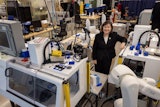The food and beverage industry in the U.S. is expecting an average 14 percent sales increase and an average profit increase of 10 percent through 2018, according to industry experts. As in previous years, sales growth is fueled by new customers, improved sales performance and new products. Market trends can change rapidly, and the tastes of consumers can be difficult to predict. To stay ahead of the game, companies need to adapt to trends and changes with great speed and agility.
One of the tools that leading companies have adopted to add agility is Customer Relationship Management (CRM). These CRM solutions have been designed to store data in a central, accessible repository — helping companies to reduce the amount of time it takes to win business, improve marketing efforts and create stronger, more data-driven relationships, closely connecting food and beverage companies with their customers. In a hyper-connected world, CRM is acquiring new features, with two trends standing out in particular: CRM is going mobile, and CRM is turning social. Both of these trends are likely to make CRM solutions even more attractive to the food and beverage industry.
Mobile features allow users to access their CRM from anywhere, on any device. This connected workforce means account managers are readily available to prospects and customers, as well as to management and support teams. In years past, sales representatives often had to get back to customers or prospects about questions they were asked; now a few clicks can be sufficient to access key product features, pricing information or product availability. Additionally, possessing actionable insight into the customer’s purchasing history can drive conversations toward potential cross-sell or up-sell opportunities.
Modern mobile solutions can easily and quickly register and track actions taken during a meeting, providing valuable data for follow-ups or an analysis of what has or hasn’t worked. Real-time analytics embedded within mobile CRM solutions can be used to improve marketing strategies, making campaigns much more targeted, and messages fine-tuned. Push and in-app notifications are possible, which brings important information to the user’s attention without the added step of opening the program. Dashboards present the right information in the most useful way. Account managers can view their pipeline by lead status or opportunity stage, while executives can check the pulse of the organization based on performance against plan. If location tracking is enabled, real efficiencies for the user can be gained by mapping optimal routes to customer and prospect locations.
Recent years have seen a blurring of the lines between personal and professional personas and social networks have accelerated this trend. The deep integration of CRM solutions with social media is opening new possibilities to determine important relationships, find new contacts and identify buying signals. Big data gleaned from social media services, online activity and information from customers with similar backgrounds provides a treasure trove of additional facts that can improve the customer experience. This information creates a richer overall profile with data regarding preferences, interests and affiliations. These enhanced profiles enable deeper levels of customer segmentation, which opens ways for much more personalized interactions.
One of the newest, most exciting features of social CRM is demographic profiling and prediction. Similar to consumer websites that showcase “customers who bought this have also looked at that” features on the web, profiling and prediction functions open up new possibilities for CRM users by prioritizing lead and opportunities based on successes from similar customers.
The combination of mobile and insight features will provide users with CRM solutions that are not just a tool or software program, but work much more like a mentor or coach. In the recent past, the user-friendliness of CRM solutions has been perceived as inferior when compared to the technologies of everyday consumer life, such as apps on smart phones. With mobile and insight features coming into their own, this perception is changing rapidly. As they become more and more intuitive, CRM solutions will become more adopted and integrated in unforeseen ways. As a result, companies will be able to make much more proactive and impactful business decisions. By utilizing the data collected by modern CRM solutions, companies are likely to become much faster and more flexible when they are adapting to changing customer needs and behaviors. This will help food and beverage companies to place themselves in the best possible position to face the challenges of the industry — and continue to thrive.
Matt Keenan is Senior Vice President of CRM for Aptean























